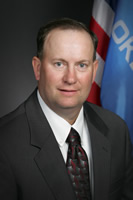In order to provide equal access and equal opportunity to people with diverse abilities, this site has been designed with accessibility in mind. Click here to view
Senate approves bill updating Oklahoma Universal Service Fund
 Sen. Eddie Fields
Sen. Eddie Fields
The Oklahoma Legislature passed the Oklahoma Telecommunications Act in 1997, which created the Oklahoma Universal Service Fund (OUSF). The Act provides funding from the OUSF to public schools, public libraries and non-for-profit healthcare providers so that those entities may have access to high speed internet connectivity without charge.
On Thursday, the Senate approved House Bill 2616, authored by Sen. Eddie Fields and Rep. Todd Thomsen, to update the OUSF funding process to keep up with changing technology.
“Over the years, technology has evolved where more devices now connect to the internet and more teaching materials are available over the internet, which demand higher Internet speeds,” said Field, R-Wynona. “Fortunately, as technology has advanced, schools, libraries and non-for-profit healthcare providers have been able to purchase faster Internet connections at a lower cost. However, the process for getting OUSF funding for these services has not kept up with these changes. House Bill 2616 will modernize the funding process.”
HB 2616 changes the administration of the OUSF from a litigation-based system to an administrative process that attempts to create certainty and clarity for service bids sought by schools, libraries and not-for-profit hospitals. The measure updates the act, established in 1997, to include new technology.
Fields noted that the measure will:
- provide more certainty to the OUSF beneficiaries by providing detailed descriptions of the
services and strict timelines for eligible providers and administrators.
- streamline the approval process yet retain the Corporation Commission’s authority to conduct
audits and deny funding if fraud is found.
- provides flexibility for the Commission to address changes as demand for more bandwidth
occurs.
- expands the contribution base to be more consistent with the federal universal service fund.
- establishes specific services and bandwidth ranges to be funded by the OUSF for schools,
libraries and healthcare providers.
- requires competitive bidding for all Special Universal Service.
The bill will now go to the governor’s office for final consideration.
 Oklahoma Senate
Oklahoma Senate

